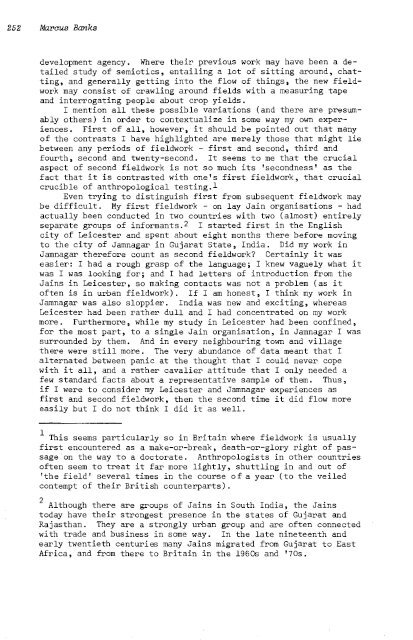CONTENTS NO.I - Institute of Social and Cultural Anthropology ...
CONTENTS NO.I - Institute of Social and Cultural Anthropology ...
CONTENTS NO.I - Institute of Social and Cultural Anthropology ...
You also want an ePaper? Increase the reach of your titles
YUMPU automatically turns print PDFs into web optimized ePapers that Google loves.
252 Maraus Banks<br />
development agency. Where their previous work may have been a detailed<br />
study <strong>of</strong> semiotics, entailing a lot <strong>of</strong> sitting around, chatting,<br />
<strong>and</strong> generally getting into the flow <strong>of</strong> things, the new fieldwork<br />
may consist <strong>of</strong> crawling around fields with a measuring tape<br />
<strong>and</strong> interrogating people about crop yields.<br />
I mention all these possible variations (<strong>and</strong> there are presumably<br />
others) in order to contextualize in some way my own experiences.<br />
First <strong>of</strong> all, however, it should be pointed out that many<br />
<strong>of</strong> the contrasts I have highlighted are merely those that might lie<br />
between any periods <strong>of</strong> fieldwork - first <strong>and</strong> second, third <strong>and</strong><br />
fourth, second <strong>and</strong> twenty-second. It seems to me that the crucial<br />
aspect <strong>of</strong> second fieldwork is not so much its 'secondness' as the<br />
fact that it is contrasted with one's first fieldwork, that crucial<br />
crucible <strong>of</strong> anthropological testing. l<br />
Even trying to distinguish first from subsequent fieldwork may<br />
be difficult. My first fieldwork - on lay Jain organisations - had<br />
actually been conducted in two countries with two (almost) entirely<br />
separate groups <strong>of</strong> informants. 2 I started first in the English<br />
city <strong>of</strong> Leicester <strong>and</strong> spent about eight months there before moving<br />
to the city <strong>of</strong> Jamnagar in Gujarat State, India. Did my work in<br />
Jamnagar therefore count as second fieldwork? Certainly it was<br />
easier: I had a rough grasp <strong>of</strong> the language; I knew vaguely what it<br />
was I was looking for; <strong>and</strong> I had letters <strong>of</strong> introduction from the<br />
Jains in Leicester, so making contacts was not a problem (as it<br />
<strong>of</strong>ten is in urban fieldwork). If I am honest, I think my work in<br />
Jamnagar was also sloppier. India was new <strong>and</strong> exciting, whereas<br />
Leicester had been rather dull <strong>and</strong> I had concentrated on my work<br />
more. Furthermore, while my study in Leicester had been confined,<br />
for the .most part, to a single Jain organisation, in Jamnagar I was<br />
surrounded by them. And in every neighbouring town <strong>and</strong> village<br />
there were still more. The very abundance <strong>of</strong> data meant that I<br />
alternated between panic at the thought that I could never cope<br />
with it all, <strong>and</strong> a rather cavalier attitude that I only needed a<br />
few st<strong>and</strong>ard facts about a representative sample <strong>of</strong> them. Thus,<br />
if I were to consider my Leicester <strong>and</strong> Jamnagar experiences as<br />
first <strong>and</strong> second fieldwork, then the second time it did flow more<br />
easily but I do not think I did it as well.<br />
1 This seems particularly so in Britain where fieldwork is usually<br />
first encountered as a make-or-break, death-or-glory right <strong>of</strong> passage<br />
on the way to a doctorate. Anthropologists in other countries<br />
<strong>of</strong>ten seem to treat it far more lightly, shuttling in <strong>and</strong> out <strong>of</strong><br />
'the field' several times in the course <strong>of</strong> a year (to the veiled<br />
contempt <strong>of</strong> their British counterparts).<br />
2 Although there are groups <strong>of</strong> Jains in South India, the Jains<br />
today have their strongest presence in the states <strong>of</strong> Gujarat <strong>and</strong><br />
Rajasthan. They are a strongly urban group <strong>and</strong> are <strong>of</strong>ten connected<br />
with trade <strong>and</strong> business in some way. In the late nineteenth <strong>and</strong><br />
early twentieth centuries many Jains migrated from Gujarat to East<br />
Africa, <strong>and</strong> from there to Britain in the 1960s <strong>and</strong> '70s.

















